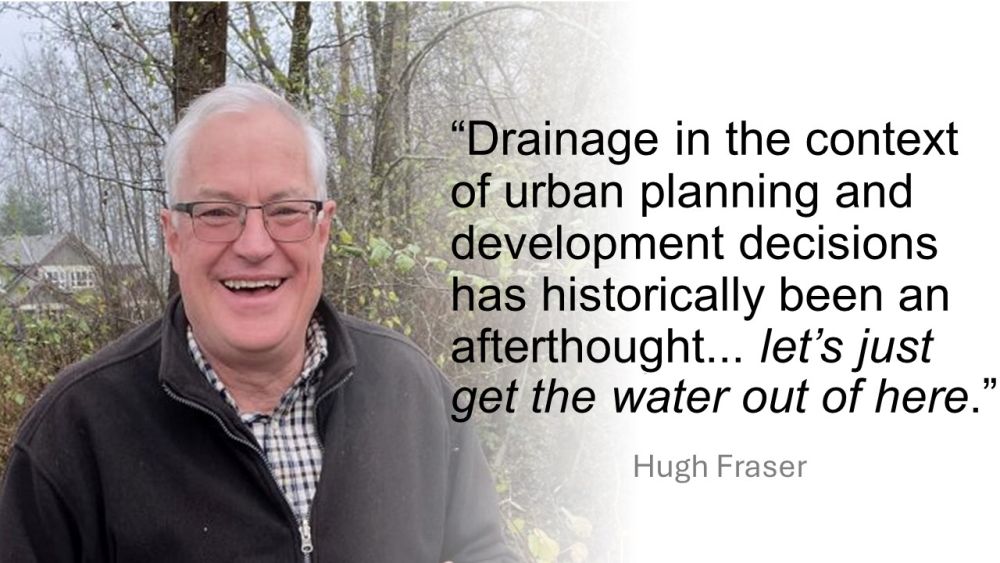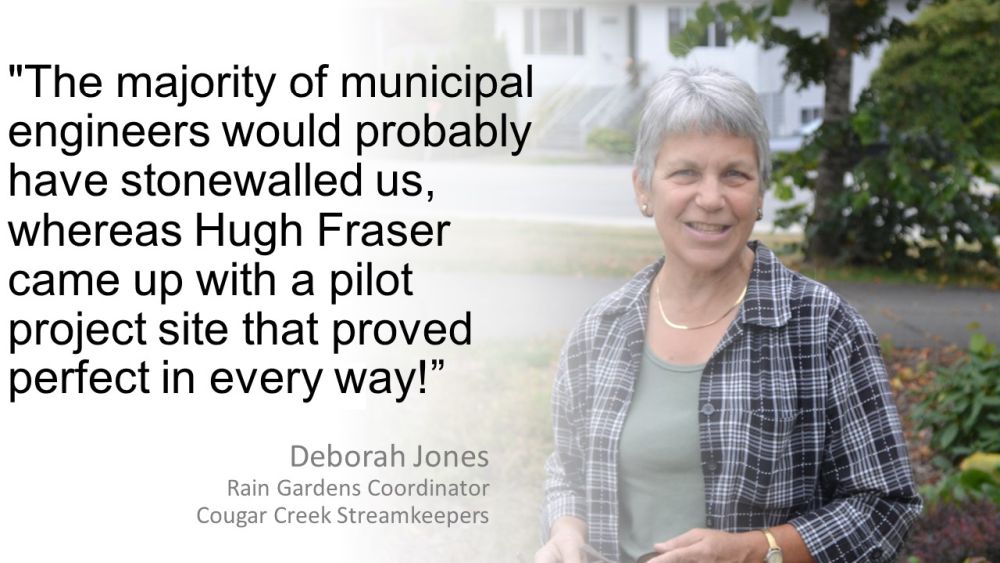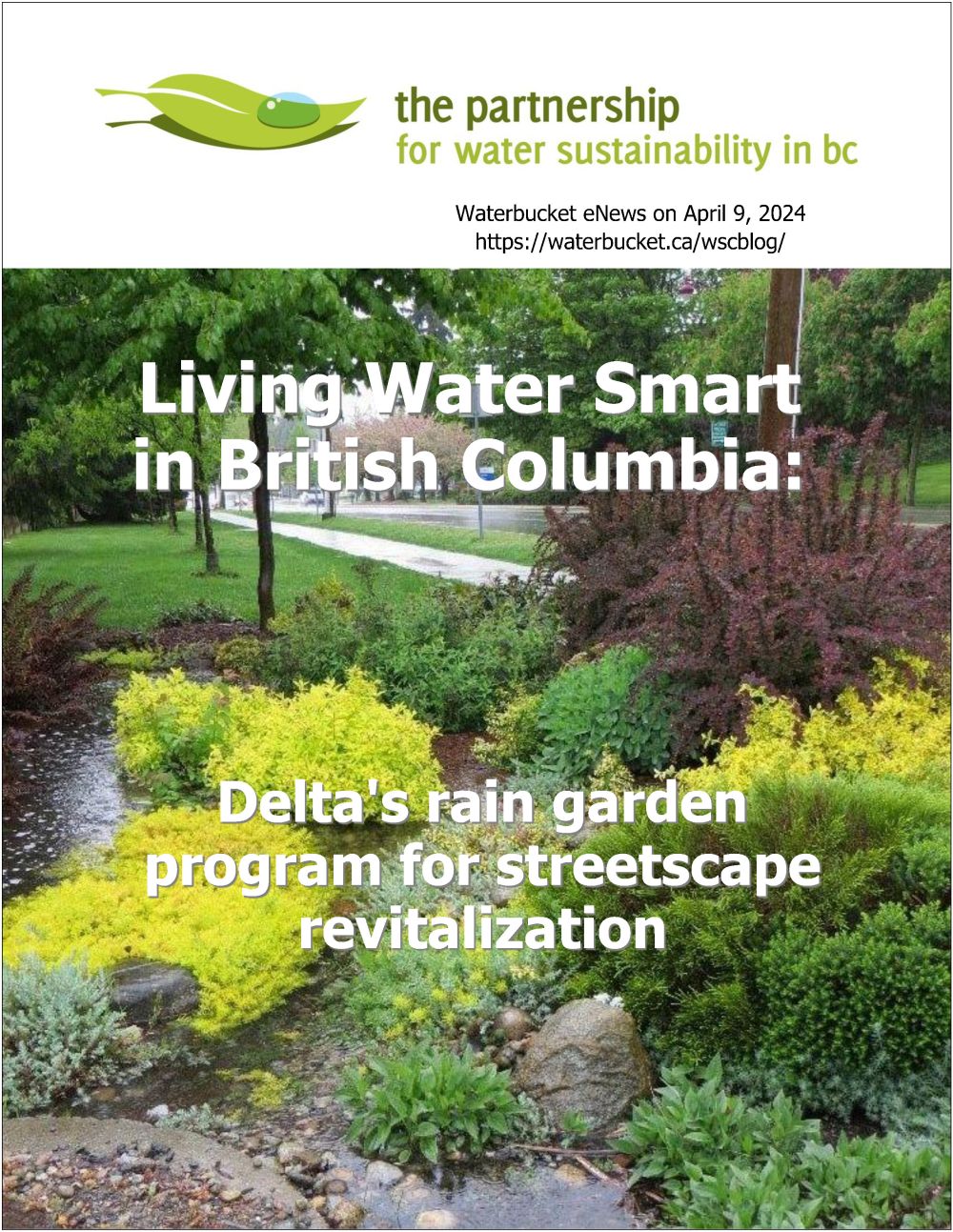LOOK AT RAINFALL DIFFERENTLY: “Drainage in the context of urban planning and development decisions has historically been an afterthought…let’s just get the water out of here,” stated Hugh Fraser, former Deputy Director of Engineering, City of Delta
Note to Reader:
Published by the Partnership for Water Sustainability in British Columbia, Waterbucket eNews celebrates the leadership of individuals and organizations who are guided by the Living Water Smart vision. The edition published on April 9, 2024 featured the City of Delta’s rain garden program for streetscape revitalization. Now in Decade Three, the program is driven by a vision for protection of stream health through the use of green infrastructure that captures and sinks road runoff. The story behind the story is told by Hugh Fraser and Harvy Singh Takhar and showcases the passing of the intergenerational baton from Hugh to Harvy.
Hugh Fraser successfully guided the City of Delta through the first two decades of its green infrastructure journey and streetscape revitalization program. He is an original “streetscape enhancement champion” in the Metro Vancouver region.

Delta’s rain garden program for streetscape revitalization
“Hugh Fraser is a green infrastructure pioneer in the Metro Vancouver region. In the early 2000s, Hugh was a leading voice on Metro Vancouver’s Stormwater Interagency Liaison Group, aka SILG, when green infrastructure was in its infancy,” stated Kim Stephens, Waterbucket eNews Editor and Partnership Executive Director.
“SILG developed the rainwater (or “streams and trees”) component of the region’s first Liquid Waste Management Plan (LWMP). The regulatory requirement for this plan component flowed from the Fish Protection Act 1997 which itself was a watershed moment as Susan Haid explained in the April 2nd edition of Waterbucket eNews.”
“Historically, drainage has been an afterthought in urban planning decisions. Neighbourhoods were developed without thinking about drainage in a broader watershed context,” explained Hugh Fraser when interviewed for this story. “Circa 2000, however, the emphasis became let’s look at this on a watershed basis. For municipalities like Delta with well-developed infrastructure, this meant figuring out HOW to retrofit and redesign drainage systems.”

Rain garden at Cougar Canyon Elementary School launched the program
“Delta’s rain garden program started with a phone call from Deb Jones, a volunteer with the Cougar Creek Streamkeepers. She expressed her wish to do a ‘ditch-scaping’ project as she described it in front of her house,” recalled Hugh Fraser.
“Deb Jones was passionate and persistent. In 2004, Deb and her group approached me with a request that the municipality undertake a stormwater pilot infiltration pilot project in North Delta. We identified the opportunity to build the first rain garden at Cougar Canyon Elementary School.”
“The project was collaborative and involved the Cougar Canyon students. The project was a success and so too was the ensuing program. Within the first decade, for example, Delta had constructed a total of 50-plus rain gardens. 10 of these were located at elementary schools.”
“Delta has some 500 kilometres of roadways. In 2005, the municipality embarked upon a long-term initiative to incrementally improve the urban landscape though a streetscape revitalization program. The corporate vision is to enhance community liveability by beautifying streets, one block at a time.”
TO LEARN MORE:
To read the complete story, download a copy of Living Water Smart in British Columbia: Delta’s rain garden program for streetscape revitalization.
DOWNLOAD A COPY: https://waterbucket.ca/wcp/wp-content/uploads/sites/6/2024/03/PWSBC_Living-Water-Smart_Delta-rain-gardens-and-streetscape-revitalization_2024.pdf


